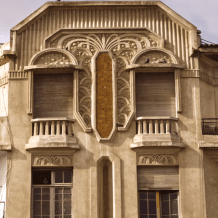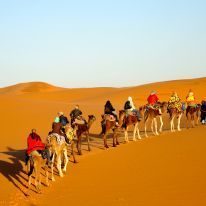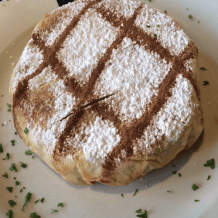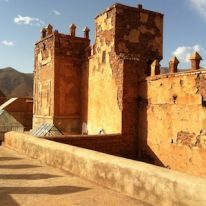
Every country has it’s own wedding culture. Traditions and ceremonies differ in each part of the world and Morocco is no exception. Moroccan weddings are a 24-hour affair and more. Just as in the west, every Moroccan wedding is different, and families from different regions whether it be cities or villages try to make their children’s weddings unique. There are a few common themes and events that occur over the course of a wedding, and knowing what to expect if you attend one is important. Morocco boasts rich wedding traditions and customs that vary by region, city and village however most have commonalities that range from unique and colorful clothing, a traditional henna party and serving special salads, meat and couscous to their guests.
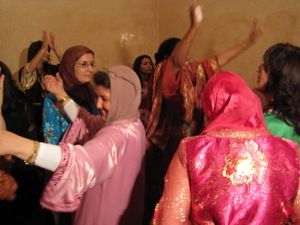
The traditional Moroccan Wedding boasts an elaborate and meaningful process. The Moroccan wedding process can take up to seven days and there are many pre-wedding ceremonies that take place before the actual wedding. With its rich cultural heritage Morocco is a place to visit for vacation if you have the opportunity to attend a Moroccan Wedding or Moroccan Wedding Tour.
Once a date has been set for a Moroccan wedding, the preparations begin. Before the wedding day, the bride is taken by female family members to a hammam. Older married woman, female friends and relatives beautify her.
What follows is the elaborate decoration and dressing of the bride in a traditional wedding caftan in the colors of the city or village – tradition. The bride is then decorated with heavy silver jewelry (in modern day often 24 carat gold given by the groom to the bride), unqiue family air looms such as a tasfift (which is word on the head) a fibula set which is worn across the brides chest among other old pieces. The brides eyes are darkened with kohl which appears a bit like thick dark eyeliner.
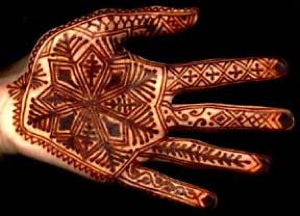
Then a Henna (beberiska ceremony) begins whereby the brides hands and feet of the bride and her party are painted with henna. The bride’s designs are always the most intricate and the various floral and geometric designs are worn to bring good luck and increase fertility.
The grooms name is often hidden in the henna designs. The brides and the grooms female family relatives will then take the opportunity to discuss the ‘secrets’ of marriage”.
In some ceremonies the bride is placed behind a curtain to symbolize her change of lifestyle. In more remote village and areas of Morocco this kind of ceremony would take place before the actual wedding.
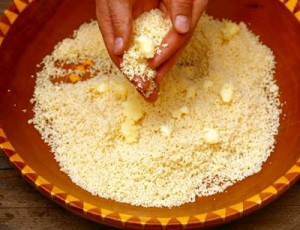
During this preparation families and friends together prepare traditional foods such as tajines made of sheep, beef and goat and couscous along with the ceremonial meal of taraoit which is eaten the next day. There is often a separate men’s dinner that takes place a day or two before the wedding event.
The wedding then begins with a joyous celebration in evening with various kinds of Moroccan music and dancing that often lasts all night long.
In Berber, Moroccan Weddings there is Ahwash dancing and Hadous drumming along with other festivities and traditions such as the bride riding a mule around the village which in modern day is often replaced with a car. In Arab, Moroccan weddings, the bride would be lifted up on a circular cushion or table and the groom on the shoulders of his friends. The Imlilchil Marraige Festival is another example of a long standing tradition in Southern Morocco with a festive celebration that takes place each September.
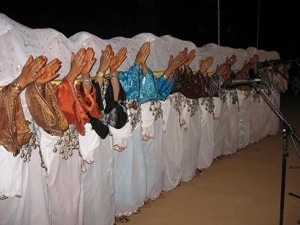
Ahwash is exclusively village music that has been unchanged for centuries performed at weddings and on special occasion. Ahwash musical texts emphasize the submission of the individual to the community. Typically, it consists of two large choruses engaging in call-and-response vocals, accompanied by instrumentalists and dancers. Since this music requires anywhere from 20 to 150 participants, it is not easily portable and so rarelyheard in the cities.
Haddous drumming is a traditional type of drumming that is played on special occasions, ceremonies and weddings. Hadous tradition uses a hand drum made of animal skin. Women and men move together forming a line or circle, then play and sing in unison.

The Moroccan Wedding tradition also has a long heritage of ceremonial caftans that are traditionally hand made by a local tailor however in modern day, many brides are buying them in shops. Hand-made caftans are typically designed with the shared ideas and traditions of the family tradition with input from the local tailor. The caftans sometimes have intricate embroidery which is done locally or instead shipped off to the town of Fes which is famous for it’s ancient traditions of caftan embroidery, skuli hand made belts and shoes.
AIT ATTA BERBER MOROCCAN WEDDING TOUR:
MAY 12th: OUARZAZATE ARRIVAL – EVENING
►Arrive at Ouarzazte’s Airport. Transfer to your Charming Riad or Hotel.
►Dinner and Spend the night at a charming Riad or Hotel in Ouarzazate.
MAY 13th: OUARZAZATE – SKOURA – VALLEY OF ROSES – BOUTHGRAR – VALLEY OF NOMADS – BOUMALNE DADES VALLEY & GORGE
►Breakfast at your Riad. Take the road to visit the Amerdihl Kasbah in Skoura and pass the Skoura Palmary. Continue the road to the perfumed Valley of Roses, just north of El Kelaa Des Mgouna. On the way to the Valley of Roses, your driver will stop for you to view the Capp et Florale shops and rose gardens in the small kasbah town that manufacture the entire nations products of eau de rose. The rose water and other products such as hand and body soaps, oil, crème perfume and dried flowers are for sale and also popular among Moroccans. The factories produce 3000-4000 petals a year. With ten tons of petals required to produce a few liters of precious oil, the harvest is understandably a labor of love and the culminating festivities of the annual Rose Festival are all the livelier for it.
►In the Valley of Roses will find miles of pink, small Persian roses-cultivated as hedgerows dividing the plots of land. In spring, you can buy a garland of fragrant roses from one of the Berber children who line the route. Continue the road to Bouthgrar, the Valley of Nomads and the Dades Valley.
►Go by pise (windy road) to visit the breakthtaking Valley of Nomads. Located in Bouthgrar is the Valley of Nomads, a beautiful 10 kilometer valley where Nomads live in caves that are surrounded by Mount Mgoun. Mount Mgoun is the second highest mountain in Morocco and boasts extraordinary views. Have tea with a Nomad family. Your journey will then take you through the Dades Valey which covers 125 km between Ouarzazate and Boumalne du Dadès in the High Atlas Mountains.
►Once you reach Boumalne at first sight you notice the limestone cliffs with uniquely shaped erosions and superb scenery and the valley’s pise. Driving along you will pass flower filled fields, fertile fields, riverbanks and several fortified ksours. At the bottom of Gorge of Boumalne Dadès.
►Lunch will be served at a nearby guesthouse with local Moroccan fare and a panoramic view. Relax and sip mint tea while gazing at the impressive valley.
► Dinner Option: La Kasbah Des Sables in Ouarzazate. Le Kasbah Des Sables is a gastronomic experience with a menu that combines the cuisine of Fes, Meknes, Tangier, Arab and Berber with 5 class fare. This restaurant offers a museum- quality atmosphere as its’ decor has been hand stitched together and is filled with Berber, Morocco traditional furniture and art that was hand crafted by local artisans in the Ouarzazate region. Each section of the restaurant offers an intimate environment and the opportunity to eat on tables that are hand painted and adorned with silver fibulas, Amber and other regional jewels.
►Dinner & Spend the night at 4 or 5 Star Riad in Ouarzazate.
MAY 14th: WEDDING DAY – OUARZAZATE – AGDZ – KASBAH TAMNOGAULT – AIT OUZZINE
HENNA PARTY – WEDDING CEREMONY – DINNER FEAST & MOROCCAN MUSIC ALL NIGHT LONG
►Breakfast at your Riad.
►9:00am: Departure from Ouarzazate to Agdz to Hammam.
►10:30am: Visit to traditional Hammam Bath. Enjoy a 90 minute rendezvous with the bride and groom at a traditional bath house.
►1:00pm: Lunch at Chez Yacoub in Kasbah Tamnougalt. Lunch at this 17th Century Kasbah in the Draa Valley. Enjoy a Moroccan tajine in this restored kasbah after the Hammmam experience.
►3:00pm: Henna Party will take place in Ait Ouzzine family home. Attend the Henna Party for the bride in Ait Ouzzine Village.
►5:00pm: Check into your Kasbah Hotel in N’kob. Relax, dress up and prepare for wedding dinner feast and evening celebration.
►7:30pm- 10:00pm: Wedding Ceremony, Dinner Feast and Music festivities.
►10:00pm- 3:00am: Evening of live music from the Souss Valley, Valley of Roses, Traditional Berber Hadous Drummers and Ahawash Dancing.
Ahwash Dancing & Singing: Ahwash is exclusively village music that has been unchanged for centuries performed at weddings and on special occasion. Ahwash musical texts emphasize the submission of the individual to the community. Typically, it consists of two large choruses engaging in call-and-response vocals, accompanied by instrumentalists and dancers. Since this music requires anywhere from 20 to 150 participants, it is not easily portable and so rarelyheard in the cities.
Hadous Drumming: Haddous drumming is a traditional type of drumming that is played on special occasions, ceremonies and weddings. Hadous tradition uses a hand drum made of animal skin. Women and men move together forming a line or circle, then play and sing in unison.
►Spend the night at Charming Riad in N’kob Village
MAY 15th: WEDDING DAY – AIT OUZZINE – ALNIF -RISSANI – MERZOUGA
CEREMONIAL VISIT – LUNCH IN AIT OUZZINE- SUNRISE CAMEL TREK – 1001 NIGHTS DINNER
►11:00am – 2:00pm: Morning Ceremonial visit of Ait Ouzzine village whereby almonds are cast to children for good luck and the bride rides a mule three times around the village to celebrate the consummation of her marriage. Celebrate with the as she wears her Moroccan, modern white and gold bridal caftan and enjoy time with family and friends.
►2:00pm: Lunch in Ait Ouzzine.
►4:00pm: Departure to Merzouga. Take the road to Merzouga passing the Sahara Desert town of Rissani and Alnif. Go by pise into the Sahara Desert as the sunsets to discover the rocky and majestic Erg Chebbi Golden Dunes.
►7:00pm: Dinner and Music along with a 1001 Nights Arabic Feast under the Sahara Desert Stars.
►Spend the night in Merzouga’s Sahara Desert at Le Belle Etoile. Options to stay in a Luxury bivouac tent or guests house at the foot of the Erg Chebbi Dunes.
MAY 16th: MERZOUGA -RISSANI – ERFOUD – TODRA GORGE – OUARZAZATE
►Sunrise camel trek before dawn into the Erg Chebbi Dunes. Explore the flora and fauna of the Sahara Desert.
►Take the road to Rissani, a Sahara desert town that is from the ancient Alawi Dynasty and the birthplace of King Mohammed VI, the current King of Morocco. Visit the old Mausolem of Moulay Ali Sharif, the first King of the Alawi Dynasty. Next visit Maison Taureg House and then the old Ksar of Rissani. Continue the road to Erfoud.
►Arrive in Erfoud, the capital of fossils in mid-afternoon. Lunch in Erfoud.
►Visit Royal Palace gate; the panoramic view from the top of the Borj-Est that rises 935 metres (3067 feet) above the city; Fossil sites in Carriere des Fossiles and the Maadid Ksar.
►Erfoud is a city located in south-east Morocco. Although many ancient fortified villages have existed in the region for several centuries Erfoud was built up by the French troops after the victory of Tafilalet Battle, that took place between 1916 and 1932. Erfoud is a very active city, full of commerce, restaurants and street cafés, hotels, banks and handicraft and souvenir shops.
►While maintaining its name as a modern Moroccan Sahara Desert town, it still preserves a certain authenticity of an true Arab city with an impressively “wild” market and gorgeous surrounding landscapes filled of oases, dunes and rocky mountains.
►Erfoud is a cinema hub for many movie directors. Some well known films had several scenes shot in Erfoud, some include names as Prince of Persia 2010 by Director Dick Richards; March or Die 1977 by Director Dick Richards; The Mummy 1999 by Director Stephen Sommers.
►In the mid – afternoon take the road to the Todra Gorge. The Gorge extends from the village of Tamtatoucheto Tinerhir. The Todra, with cliffs rising dramatically up to 300m on each side of a narrow corridor, make up some of the most impressive cliffs and are by far, the highest in Morocco.
►Lunch in the Todra Gorge.
► The Todra Gorge is a spectacle with its gigantic rock walls changing color to create magical effects with the sunlight. In the morning, when the sun permeates through the bottom of the gorge, the rock changes from pink rose to deep ochre gradually throughout the rest of the day.
►Dinner & Spend the night at charming Riad in Ouarzazte.
MAY 17th: OUARZAZATE DEPARTURE
►Breakfast at your Riad or Hotel in Ouarzazate.
►Departure from Ouarzazate’s Airport.
For more information about Morocco Tours or attending a Moroccan Wedding
For more information about Travel and Tours to Morocco plus highlights on Moroccan culture visit Morocco’s Imperial Cities, Seaside Resorts,Sahara Desert, Berber villages, A Taste of Morocco, Magical Kasbahs, Ruins & Waterfalls, Absolute Morocco, The Best of Marrakech, Fes, and Ouarzazate
Travel Exploration specializes in Morocco Travel.We provide Tours and travel opportunities to Morocco for the independent traveler and tailor-made tours for families and groups with a distinctly unique flavor. From Morocco’s Seven Imperial Cities, to the Magical Sahara Travel Exploration offers a captivating experience that will inspire you. At Travel Exploration we guarantee that you will discover the best of Morocco! Call Travel Exploration at 1 (800) 787-8806 or 1 (917)703-2078 and let’s book a tour to Morocco for you today.
Moroccan Wedding Traditions, Moroccan Wedding Tour, Berber Wedding Tour, Caftan, Moroccan Caftan, Sahara Desert & Ouarzazate Kasbahs, N’kob, Ait Ouzzine, Casablanca Tour, Marrakech Tour, Fes Tour, Ahwash Dancing, Hadous Drumming Casablanca, Morocco Holidays, Morocco Travel, Travel Exploration, Travel to Morocco



